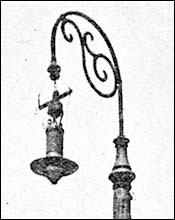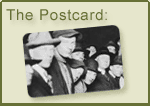|
|||||||||||||||
|
The Story
Resources
Background
|
By Stephanie Hemphill, Minnesota Public Radio
June 2001
|
|
RealAudio |
 View the street on the day after the lynching and the way the same location looks today.
View the street on the day after the lynching and the way the same location looks today. |
The corner where the men were strung up is in a gritty part of downtown Duluth. Patrons at the Kozy Bar are mostly people who are down on their luck. The Shrine Auditorium stands as it did in 1920. Up until last year, there was nothing to mark what happened here on that mid-June night. About 50 people working for nearly a year to change that. Heidi Bakk-Hanson is one of them.
"I work right there, down the block at Carlson Books. So I walked past here twice every day for three years after I heard about it. And it drove me nuts because there's nothing here, there's no marker. When you stand here and you imagine 10,000 people just along this street, it's overwhelming," she says.
Bakk-Hanson is part of the Clayton-Jackson-McGhie Memorial Committee. The group was successful in creating a pocket park with a memorial sculpture here. Bakk-Hanson and others say a physical reminder of the lynching is important - but not just to teach people about history. About half of the committee members are African-Americans, and they say the racism that led to the deaths of three innocent men in 1920 is still very much a part of Duluth life.
Melissa Taylor's family has been in Duluth for three generations, but she says many people here still treat her like an outsider.
"I still feel it when I walk into an all-white setting. I still feel it when I walk down the street and people turn their heads to stare. I still feel that incredibly tense kind of - I wouldn't call it hate - but it's certainly that you're different," says Taylor.
|
" This isn't a project to raise money to build a memorial. This is a project to get our community thinking about the future of racial equality in Duluth. " - Deputy police chief Bob Grytdahl
|
Another committee member, Portia Johnson, raised her children and grandchildren in Duluth. Johnson works for the county and volunteers her time on public boards and committees. She keeps her hair short and wears a ball cap, and sometimes she's mistaken for a young man. When she bought a new Jeep, she worried the police might pull her over.
"I knew that I would probably be thought of as a male, from the back. Well, I was stopped to see if I was a gang member. They had the audacity to ask me, 'How could you afford it?' Because someone with a brand new Grand Cherokee, of course I had to be dealing in drugs or doing something that was illegal. That's a form of racism," says Johnson.
As in many places around the country, some minority people in Duluth say police treat them unfairly. Duluth's deputy chief of police, Bob Grytdahl, says it's unfair to single out the police for criticism. Grytdahl is also on the memorial committee. He says the overt and violent racism that led to the lynching in 1920 has changed into a more subtle, systemic racism that still destroys the futures of young black men every day. Grytdahl says the committee needs to move beyond symbols, and reach outside itself to convince local business and community leaders they should work to eliminate racism where they have influence.
"You've got to get into the hierarchy that makes decisions on hiring and mortgage lending and medical providers - all those different parts of the community where there isn't equal opportunity for everybody - to make those changes," Grytdahl says.
The committee supports a scholarship program that helps local young people pursue higher education. It's named after the three lynching victims.

|
|
Melissa Taylor is a member of the Clayton-Jackson-McGhie Memorial Committee. She has lived all her life in Duluth, but says she still feels as though white people treat her as an outsider. (MPR Photo/Stephanie Hemphill) |
"That first year, 1997, I asked my students how many knew that a lynching had occurred here in Duluth and I had just a couple of hands raised. I thought, wow, this is a subject that really needs to be covered, and from then I started teaching about the topic," says Nachbar.
Some of Nachbar's students have taken on a special project - creating curriculum materials about the lynching, and about racial tensions and diversity issues. It'll be designed for 10th grade international studies classes. Junior Toni Roberts says even though the class isn't required, she thinks everyone will hear about the lynching because students taking the class will tell their friends about it.
"Teenagers need to know what has happened in the history of a town like Duluth. It's not a big place but bad things can happen anywhere," Roberts says.
Some people in Duluth say it's a mistake to bring attention to such an ugly event as the lynching. They say it's opening old wounds. But deputy police chief Bob Grytdahl, like other members of the committee working on the memorial, says it's more about the future than it is about the past.
"This isn't a project to raise money to build a memorial. This is a project to get our community thinking about the future of racial equality in Duluth. And it should be the beginning of an introspective look at what Duluth really wants to be," says Grytdahl.
Someday, organizers hope 10,000 people will gather in downtown Duluth, to remember an injustice perpetrated by an equal number more than 80 years ago, and to show respect for differences today.

